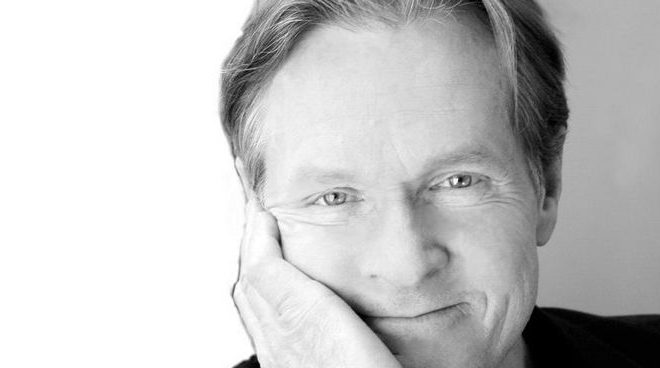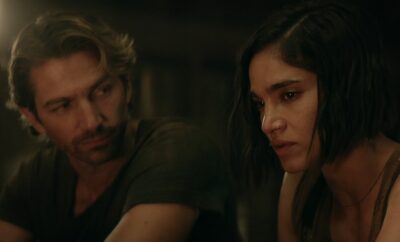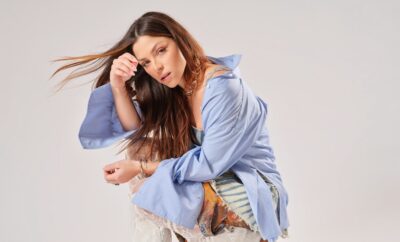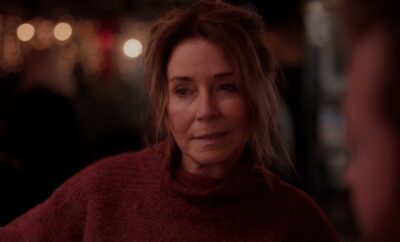
Interviews
William Sadler – When They See Us
By: Jamie Steinberg
Q) What are the recent projects that you are working on?
A) I just finished filming a movie called V.F.W. down in Dallas, Texas with Stephen Lang and Martin Kove and David Patrick Kelly and George Wendt. It’s a horror movie, but it is all these old veterans of wars hanging out in a VFW post. A group of young teenagers on this brand-new crazy designer drug come attack the post and we have to fight them off all night long. We filmed it for Fangoria. It was really fun. It was very bloody. I’m still doing “Our Cartoon President” and I’m voicing Mitch McConnell, Jeff Sessions, John Kelly and Wilbur Ross. I’m also in negotiations for Bill & Ted Face the Music.
Q) What does it mean to you to get to return to the Bill & Ted world?
A) I think it will be a gas. I really do! People have waited a long, long time to see the Wild Stallions back together again. It was great fun to do. Then, it just drifted back into the cervices of time, like a lot of films. Everybody moves on and I forgot about it. But I would hear about it at fan conventions where people would ask if there was going to be a Bill & Ted 3. It has been in the works for a very long time and I guess they finally got it together. I love the script! It’s the same Bill (Keanu Reeves) and Ted (Alex Winter). Everyone comes back from the other movies. I’m excited about that.
Q) You have had quite a lengthy career! What have been some of your favorite projects to have worked on?
A) I’m not sure what stands out in my body of work. I know that Shawshank is a pretty wonderful film that has stood the test of time. It’s number one on the IMDB “Best 250 Movies” or something. That may be the best movie that I’ve ever done, just sort of classic. But there have been lots and lots of projects. They are like children; I like the one that I’m with at the moment. It’s hard to pick favorites. I enjoyed doing Iron Man 3. I like acting. One of the reasons I do so many projects is that they ask me to. Producers come to me and say, “Will you do this?” I’m fortunate enough to be able to say “yes” a lot. I still get a big kick out of it. I have more fun acting now than I did when I was in my 20’s or 30’s. I think I used to fuss and fret a lot more. I’m not sure the acting was any better. Now that I’m a little older, I think I’m a little freer with myself – not so precious with my emotions and what have you. I paint with lots more colors now, if you know what I mean.
Q) You often take on dramatic roles. What draws you to working in this genre?
A) Yeah, some of that is just what Hollywood…First of all, I did years and years and years of theater before I even came to the movies. I lived in New York. I studied acting for six years in college. Then, I moved to New York and did eleven years of theater off Broadway and off-off and on Broadway. So, I came to the movies late. I think my first film was Project X with Matthew Broderick and Stephen Lang and Helen Hunt. I don’t have a preference. I enjoy the comedy when I get a chance to be funny. I naturally lean towards humor in characters and I always look for it, even in dramatic moments. In a way, it’s like life. In the middle of the most dramatic moments something totally ironic and silly will happen. The best comedies always have just a drop of heartbreak in them and the best dramas always have something that makes you laugh. I felt that way about Shawshank, too. I saw my character as the comic relief after a while as Heywood was not the brightest character on screen. He was always a step behind. Because of that he was funny. He could mistake that horse ball for a rock they were looking for. I felt like that was his function in the film – to give people a smile and let them life and chuckle for a second because it gets pretty dark. Like I said, the best dramas always have some humor sprinkled around. The audience needs to breathe. Hitchcock knew that. That’s just good filmmaking I think – good storytelling.
Q) Talk about the series “When They See Us” and about the individual you portray.
A) I play Mike Sheehan in “When They See Us” and it’s one of the things I’m most proud of. I think it’s going to be a terrific four-part event. Ava DuVernay directed it and it’s the second time I worked with her and she’s just fantastic. She’s just a force of nature. It’s the story of The Central Park Five – the five young black boys who were picked up in Central Park and railroaded through the courts and sent to prison for a crime they didn’t do. It’s a true story. I remember I was in New York when it occurred and Donald Trump, in fact, bought great big ads in four major New York papers calling for the death penalty for these young men. Then, they were all exonerated fifteen years after – their lives ruined and their family’s lives ruined for something they had no part in. It’s an important story. If history doesn’t repeat itself…Certainly, it echoes all over the place. It sounds exactly like the kind of thing that is still going on to this day. I am very proud to be a part of that.
Q) Did you have to do much research for your portrayal?
A) I was familiar with The Central Park Five story. That was my period of time in New York as well. We did research. We met the actual gentlemen whose lives were irrevocably changed. That should be a fantastic series. I’m very proud of this one.
Q) What did you find the most challenging aspect about your portrayal?
A) I play Mike Sheehan who was one of the first detectives on the scene and rounded up these kids and worked them over. He interrogated them endlessly for hours and hours and hours without lawyers, their parents or breaks until he got them to “confess.” He bullied them into it. They were fifteen and fourteen years old. I think the hardest part for me was working with the young actors and being as tough on them as Mike was in the scene. Where they are playing good cop and bad cop to get the kids to move, I was the bad cop. I’d get in their face and be as threatening as I possibly could be to these sweet young actors. [laughs] Some of them had never been on film before! After almost every take I would take the kid’s hand and say, “You okay? Are you alright? You were great in that. I’m sorry I have to be so mean to you.” It’s the nature of the role.
Q) How did you shake off a long day of filming?
A) I don’t know. I justify it…I was proud to be a part of the project. I was enjoying the challenge of it, frankly. One of the nice things about this career, this business, is you have these tools and skills to bring to the project, but the projects keep changing out from under you. It’s always a problem-solving thing. How do you best serve this script? The requirements are different. It’s one of the things that I find the most fun, the projects keep changing. The challenges keep changing. It just keeps it interesting. I don’t know what I would do if I played the same character over and over again for decades like I see some actors. On the upside, I guess you would make an awful lot of money, but I’m pretty sure the challenge of doing it…You develop a shorthand and mannerisms and you can get through a day of filming – bing, bing, bing. I wouldn’t mind being a regular on a series for a long time. I could use the financial upside, but I have to say I really do enjoy going from one project to another project because the people change, the directors change and the locations change. I shot a horror movie in Winnipeg and I got to spend three weeks in Winnipeg. And what is required to play these different characters changes. So, I bring my bag of tools and break them down and do the work. And go home. [laughs] And they are usually very intense when you’re in the trenches and shooting long days. Like this thing F.W. I just did, it was super long days and everyone is exhausted. You’ve got to be able to pull it together at hour twelve, thirteen or fourteen where they finally get to your scene and you have to pull something out of your socks to put on the screen. Those sorts of challenges keep it interesting.
Q) Was there someone you were looking forward to sharing a scene with or meeting?
A) No one in particular. Mostly I was looking forward to working with Ava again. She was really my touchstone.
Q) Talk about working with director Ava DuVernay.
A) Like I said, she’s a force of nature. This is the second time I got to work with her. I did a pilot that she did. I love working with Ava. I think she brings a sensitivity and a passion to these things that you don’t see everywhere. I have done a lot of film and she stands out amongst the directors that I’ve worked with because of the passion. She moves around that set and makes things happen. She cares for people and takes care of the actors and crew. She keeps her arms around the entire project, which is not an easy thing to do. And she does it with humor and with energy. I just love working with her. I’ll do that again and again.
Q) What were some of your most memorable moments or scenes from filming?
A) There was one moment where we were interrogating this young man for the first time. The camera was on him. Ava came over to me and whispered, “Scare the hell out of him.” So, while the camera was on him, I picked up a chair and slammed it against a filing cabinet and marched over to him and started the scene right in his face. [laughs] It was a great take for him because he wasn’t expecting it. I think he was genuinely terrified. When it was over I said, “Are you okay? Are you alright?” There were lots of memorable moments. Meeting the actual Central Park Five. Those were memorable moments.
Q) What did you personally take away from working on this project?
A) It’s interesting. My evolution (I’m embarrassed that it came as late as it did) came with Trayvon Martin. When a young man goes to the 7-11 and is walking home with Skittles and an iced tea and is killed and his killer gets off…Barack Obama said, “If I had a son, he would look like Trevon.” It just resonated with me. He also said that he, himself, was crossing the street he could hear car doors locking. Barack Obama. And it began to dawn on me that I don’t live in that world. When I get pulled over by the police, I’m annoyed, but I’m not afraid they are going to pull out their weapons and shoot me in the seat where I’m sitting. They aren’t going to slam me against the car. I don’t have the same relationship with the law that most African Americans apparently do. It occurred to me when the Black Lives Matter movement stated, when it really took off. You’d hear white people say, “All lives matter! What do you mean ‘black lives matter?!’ All lives matter.” It began to dawn on me that of course all lives matter, but you haven’t been living in this world where their lives don’t matter. Where prison sentences are common and longer, beatings and Rodney King, etc. with the abuses that they have suffered at the hands of the justice system in this country. If you’re a white person living in most communities in this country you don’t see it. Your kids don’t see it, you don’t see it. You don’t ever have to be afraid that way. It began seeing how The Central Park Five were dealt with and realizing that has gone on for decades and decades. That kind of injustice is still going on – Ferguson. The penny finally dropped for me about this parallel universe in which African Americans live where the law is not your friend where you need to be afraid. You’re not going to be treated the same. You’re not going to get the same length of prison term. That’s what I came away with it.
Q) You are a part of social media. Are you looking forward to the dialogue it will open for those watching the series?
A) I am looking forward to the dialogue it starts. If it gets people talking and thinking about that exact thing that I just described, that there are two different Americas going on at the same time. If it gets people to see that it will have done a great social good. I think it’s important that…It’s funny, it’s one of the things that television and movies do. I think it’s a function that used to be served by books. They were the conscience of our country, but I think television and movies do it now. I think there is a lot we can learn from the past and The Central Park Five story is a brilliant example of how badly we can get it wrong. You do the work off on a location somewhere and it is very intense and it goes on for weeks. Everybody goes home and, at some point, the project gets launched and the movie goes out into the public or the TV show goes out and lands and millions of people see it, but the actors (those of us involved in creating it) never get to see how it lands. We’re not in the room when people have their reaction to what you did and the story that you told. Unlike the theater where the reaction is immediate and you can tell if they were move or found it funny, so with the advent of social media that is the place where you found out how you did. [laughs] You get dozens and dozens of tweets about something. You say, “Oh! That meant something.” I’ll meet people who come up on the street to me and they’ll say that when their father was dying they watched Shawshank every week because it was his favorite. You have no idea! People take these projects and make them their own. “That’s my favorite movie. That’s my favorite character.” I did three episodes of “Deep Space Nine” back in like 1993 (I guess) and people come up to me and quote the lines. It landed on them and it became a part of their lives, which is always just fascinating to me because the job came and went in my life. I was on to the next job and the next job and the rest of my life. But the projects go out there and land on an audience. For example, I did Bill & Ted’s Bogus Journey and The Grim Reaper had this “Reaper Rap” that goes, “You might be a king or a little street sweeper, but sooner or later you dance with the reaper.” After the movie came out, I got a phone call that there was a man executed and the warden read his last words which were, “You might be a king or a little street sweeper, but sooner or later you dance with the reaper.” [laughs] I happen to have written that little stanza for the movie so the press was calling me to ask how I felt about this guy’s last words. I said, “I hate to lose a fan over any circumstance.” That’s what I mean. It meant something to him. [laughs] Sitting there on death row to see a kindly Grim Reaper – that was a sentiment that meant enough to him to let it be his last words. That’s what I mean. We just never know these days, doing television and film, how people going to react and how they are going to take these projects and make them part of their lives. That’s always fun to discover.
Q) What would you like to say to everyone who is a fan and supporter of you and the work you do?
A) [laughs] Well, I’d mostly like to say thank you for giving me the opportunity. We don’t do this in a vacuum. The only reason that I keep getting asked to work on project after project is because of that audience and the reaction that I get. So, a great big thank you! I’m a grateful actor.





You must be logged in to post a comment Login